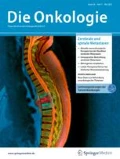Zusammenfassung
Hintergrund
Eine onkologische Erkrankung hat Auswirkungen auf das gesamte persönliche Umfeld des Patienten. Angehörige, als wichtigste Unterstützer und Betroffene zugleich, sind herausgefordert, mit Belastungen umzugehen und zu meistern. Sie sind wie der Patient meist unvermittelt mit der Fragilität und der Endlichkeit des Lebens ebenso wie mit Krankheit, Leid und Schmerz konfrontiert. Gleichzeitig erfahren sie kaum professionelle Unterstützung und finden nur wenig Beachtung im Behandlungssystem.
Fragestellung
Welche Rolle können Angehörige im Prozess einer onkologischen Behandlung einnehmen und wie können die Angehörigen unterstützt werden?
Material und Methode
Es werden Ergebnisse einer selektiven Literaturrecherche und Erfahrungen aus der Praxis zu Aufgaben und Belastungen von pflegenden Angehörigen in Bezug auf eine Krebserkrankung dargestellt. Daraus abgeleitet werden Empfehlungen im Umgang mit den Angehörigen beschrieben.
Ergebnisse
Pflegende Angehörige zeigen oft gleich hohe, z. T. höhere Ausprägungen in den Belastungen als Patienten. Gleichzeitig haben sie keine klar definierte Rolle im Behandlungsauftrag des Onkologen.
Schlussfolgerung
Pflegende Angehörige werden als wichtigster Unterstützer der Patienten in ihrer Not nicht ausreichend beachtet und entsprechende Unterstützungsmöglichkeiten nicht angesprochen. Neben einer patientenzentrierten ist eine angehörigen- bzw. familienzentrierte Kommunikation notwendig, um eine „best practice“ der Behandlung und Begleitung in der Onkologie zu erreichen.
Abstract
Background
Oncological disease has an impact on the patient’s entire personal environment. Relatives, who simultaneously represent patients’ main supporters and also those persons most affected, are challenged to deal with stress and conquer burdens. Like the patient, their friends and relatives are usually confronted suddenly with the fragility and finite nature of life, as well as with disease, suffering, and pain. Despite this, they receive next to no professional support and only little attention within the treatment system.
Question
Which role do caregiving relatives adopt in the process of an oncological treatment and how can they be supported?
Materials and methods
For this purpose, a selective literature review was conducted. Combined with practical experiences with to the cancer-related duties and burdens of caregiving relatives, recommendations for dealing with relatives are described.
Results
Caregiving relatives of cancer patients seem to experience cancer-related distress equal to, or even more severely, than the patients themselves. At the same time, they have no clear defined role in the oncologist’s treatment scheme.
Conclusion
Caregiving relatives, as patients’ main supporters, do not receive sufficient attention in their hour of need, and appropriate support options are not addressed. Beside patient-centered, caregiving relative- or family-centered communication is necessary to reach a best practice in oncological treatment and support.

Literatur
Back AL, Arnold RM, Baile WF et al (2007) Efficacy of communication skills training for giving bad news and discussing transitions to palliative care. Arch Intern Med 167:453–460
Baider L, Walach N, Perry S et al (1998) Cancer in married couples: Higher or lower distress? J Psychosom Res 45:239–248
Dionne-Odom JN, Azuero A, Lyons KD et al (2015) Benefits of early versus delayed palliative care to informal family caregivers of patients with advanced cancer: outcomes from the ENABLE III randomized controlled trial. J Clin Oncol 33:1446–1452
Gröpper S, Van Der ME, Landes T et al (2015) Assessing cancer-related distress in cancer patients and caregivers receiving outpatient psycho-oncological counseling. Support Care Cancer 1–7. (publish online 02.12.2015)
Holland JC (2002) History of psycho-oncology: overcoming attitudinal and conceptual barriers. Psychosom Med 64:206–221
Huse-Kleinstoll G (2013) Psychoonkologische Arbeit mit Familien. In: Schulz-Kindermann F (Hrsg) Psychoonkologie – Grundlagen und psychotherapeutische Praxis. Beltz Verlag, Weinheim, Basel, S 188–199
Mcmullen C, Schneider J, Altschuler A et al (2014) Caregivers as healthcare managers: health management activities, needs, and caregiving relationships for colorectal cancer survivors with ostomies. Support Care Cancer 22:2401–2408
Nelles W, Mccaffrey R, Blanchard C et al (1991) Social support and breast cancer: a review. J Psychosoc Oncol 9:21–34
Pitceathly C, Maguire P (2003) The psychological impact of cancer on patients’ partners and other key relatives a review. Eur J Cancer 39:1517–1524
Schulz K, Schulz H, Schulz O et al (1998) Krebspatienten und ihre Familien: Wechselseitige Belastung und Unterstützung. Schattauer, Stuttgart
Strittmatter G, Mawick R (1996) Patient, Angehörige, Behandler – Entwicklung systemischer Perspektiven in der Onkologie. TOSCH, München
Weitzner MA, Mcmillan SC, Jacobsen PB (1999) Family Caregiver Quality of Life: Differences Between Curative and Palliative Cancer Treatment Settings. J Pain Symptom Manage 17:418–428
Author information
Authors and Affiliations
Corresponding author
Ethics declarations
Interessenkonflikt
M. Preisler und U. Goerling geben an, dass kein Interessenkonflikt besteht.
Dieser Beitrag beinhaltet keine Studien an Menschen oder Tieren.
Alle Patienten, die über Bildmaterial oder anderweitige Angaben innerhalb des Manuskripts zu identifizieren sind, haben hierzu ihre schriftliche Einwilligung gegeben. Im Falle von nicht mündigen Patienten liegt die Einwilligung eines Erziehungsberechtigen oder des gesetzlich bestellten Betreuers vor.
Rights and permissions
About this article
Cite this article
Preisler, M., Goerling, U. Angehörige von an Krebs erkrankten Menschen. Onkologe 22, 336–341 (2016). https://doi.org/10.1007/s00761-016-0006-8
Published:
Issue Date:
DOI: https://doi.org/10.1007/s00761-016-0006-8

